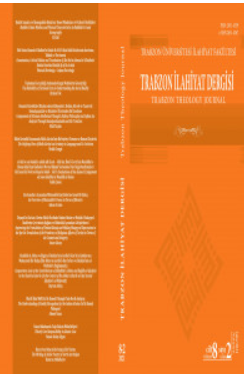el-Alâî ve en-Nakdü’s-sahîh Adlı Eseri – Alâî’nin, İbnü’l-Cevzî’nin Mesâbîhu’s-Sünne’deki Bazı Hadislere Mevzu Hükmü Vermesine Dair Değerlendirmeleri
'Alāʾī and His Work al-Naqd al-Sahîh - ʿAlāʾī’s Evaluations of Ibn al-Jawzī’s Judgement on Some Hadiths in Maṣābīḥ al-Sunna
Author(s): Fatih ÇimenSubject(s): Islam studies, 13th to 14th Centuries, Hermeneutics, Qur’anic studies
Published by: Karadeniz Teknik Üniversites - İlahiyat Fakültesi
Keywords: Ḥadīth;ʿAlāʾī’s; Ibn al-Jawzī; Fabricated (mawduʿ); Maṣābīḥ;
Summary/Abstract: Ṣalāḥ al-Dīn al-ʿAlāʾī (d. 761/1359) was a scholar who lived in the period of the Mamluks, who made important contributions to the science of ḥadīth both with his duties in ḥadīth schools, and his works in the field of ḥadīth criticism/the discipline of al-jarḥ wa-l-taʿdīl (impugning and accrediting). One of his works on the science of ḥadīth is Ibn al-Jawzī’s (d. 597/1201), al-Naqd al-Sahîh, which he wrote in order to explain that the ḥadīths that he decreed were fake up in Maṣābīḥ al-Sunna are not as claimed. The author’s work in question is one of the first texts of authorship written for Ibn al-Jawzī’s al-Mawḍū‘āt and al-‘Ilal. This article focuses on ʿAlāʾī’s life, his identity as a muḥaddith and his contributions to the science of ḥadīth, as well as his evaluations on some of the ḥadīth in question in our country. The aim of the study is to identify ʿAlāʾī’s personality and the introduction his work, the method he followed in his analysis of ḥadīth, and to gain an idea about whether there is a need for additional studies today regarding the narrations that scholars have given fabricated judgment in the past. When ʿAlāʾī’s work is examined, it is seen that he makes successful analysis of isnād by revealing the sects that are suitable for being subordinates of the narrations and making in-depth research on obliged narrators, in contrast to the superficial evaluations of Ibn al-Jawzī. However, it is also noteworthy that the author almost never included text criticism and shawāhid type narrations in these analyses. Researches on al-Naqd al-Sahîh and similar works written in the form of rejection of the narrations taken in the works of legislation will play an important role in determining the methods to be followed in new studies on this field.
Journal: Trabzon İlahiyat Dergisi
- Issue Year: 8/2021
- Issue No: 2
- Page Range: 156-189
- Page Count: 34
- Language: Turkish

